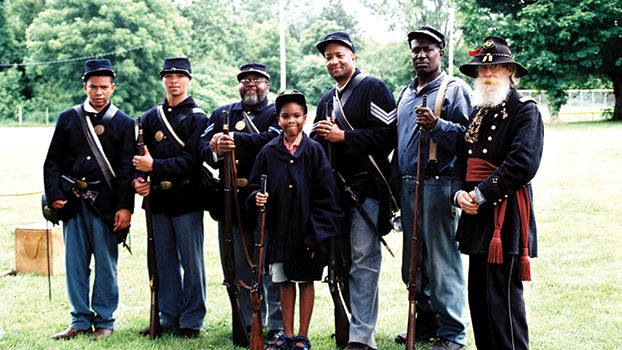The Underground Railroad in Cass County — Part IV
Published 8:49 am Thursday, March 1, 2018

- Re-enactors representing Civil War 102 colored troops pose for a picture. (Submitted photo)
VANDALIA — While far removed from the plantations of the slavery-era South, Cass County played an important role in the history of the abolitionist movement during the mid 1800s.
The stories of the escaped slaves and those who harbored them during their flights North toward freedom have been documented and preserved by the dedicated members of the Underground Railroad Society of Cass County.
In celebration of Black History Month this February, Cathy LaPointe, treasurer and founding member of the URSCC, will feature a series of four articles that highlight the story of the Underground Railroad in Vandalia and other local communities.
Kentucky planters were incensed that slave catchers were not allowed to return “their property” to them. They demanded that their friend, Senator Henry Clay, include a more stringent Fugitive Slave Act as part of the Compromise of 1850. This new law was draconian. It declared that captured slaves had to be returned to their owners, and officials and citizens had to cooperate or be fined and imprisoned. Captured slaves had no rights in court and no defense. A white man could drag any black man or woman south into slavery solely on the power of his word.
Before the Fugitive Slave Law of 1850, many people in this area had no opinion on slavery. Birch Lake Quakers split on the Underground Railroad, and those who wanted to be active were dismissed from the meeting. However, the Enhanced Fugitive Slave Law of 1850 galvanized northern sentiment against slavery. Birch Lake Quakers reunited and became active on the UGRR, along with many free blacks and others.
Many free states refused to comply with the Fugitive Slave Act of 1850, Michigan included. In 1855 Michigan passed the Personal Freedom Act, which guaranteed to anyone claimed as a fugitive slave all the benefits of habeas corpus and the right to a jury trial. It prohibited the use of state and local jails for holding accused fugitive slaves. It said any attempt to send a freed man or woman south into slavery was a crime, subject to fine and imprisonment.
When the Civil War started in 1861, South Carolina claimed free states’ refusal to comply or “nullification” of the 1850 Fugitive Slave Law as the first complaint when it listed the reasons for succession.
Black men were not allowed to fight in the Civil War until President Lincoln issued the Emancipation Proclamation in 1863. At that time more than 100 black men in this area, mostly from Calvin Township, joined the 102 Colored Troops and fought bravely in battle. They formed the Matthew Artis Post of the GAR in Calvin Center, and many are buried in Chain, Lake, Mt. Zion and Bethel cemeteries.
The legacy of the Underground Railroad in Cass County Michigan became manifest in the number of prosperous black farms, and cooperation and friendly relationships among the residents. It continued in schools where black and white children in Calvin township and Vandalia studied together from the start. To this day it is a still mixed community, racially harmonious, and supportive of each other. Descendents of original Quakers and free blacks, as well as freedom seekers, still reside in the area.
The non profit Underground Railroad Society of Cass County was founded in 2010, with the mission of researching and telling the story of the UGRR in Cass County and the role local Quakers, African Americans and other abolitionists played. The organizations goals are the restoration of the James E. Bonine House and Carriage House as focal points for telling this story. Leaders are proud that they are well along on both missions and goals. Much more info is available on urscc.org You can download our 19 site UGRR Self-Guided Driving Tour, or find a map near the UGRR marker in the park in Vandalia. You can tour the Bonine House and Carriage House May through October. URSCC annual events are the Sam Adams and Portage schools UGRR Wax Museums in early June, Underground Railroad Days the second weekend of July and Christmas at the Bonine House the first two weekends of December.





